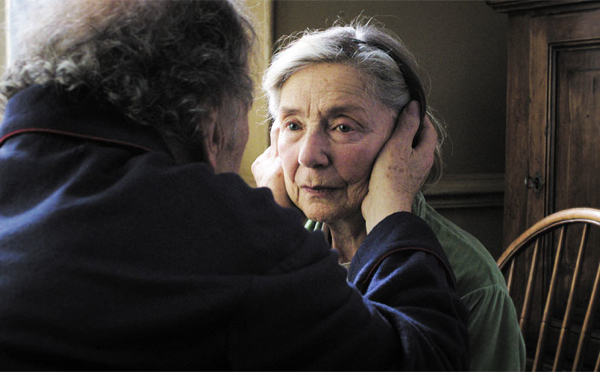Movie review by Greg Carlson
A measured memento mori coiled with the director’s signature refusal to indicate any absolute moral transparency, Michael Haneke’s “Amour” meticulously chronicles the physical decline of an octogenarian music teacher whose gradual slide into end-of-life helplessness is witnessed and attended to by her husband. Confining the action almost entirely to the Parisian apartment shared by Georges (Jean-Louis Trintignant) and Anne (Emmanuelle Riva), Haneke frames the action – or lack thereof – in long takes of the quotidian repetitions (eating, using the bathroom, getting into or out of bed) that the able-bodied take for granted.
Until now, to American audiences Emmanuelle Riva was best known for her turn in Alain Resnais’ 1959 classic “Hiroshima mon amour,” even though the performer has appeared in movies directed by Gillo Pontecorvo, Jaco Van Dormael, Jean-Pierre Melville, Georges Franju, Krzysztof Kieslowski, and recently, Julie Delpy. Currently in her mid-eighties, Riva constructs a harrowing, immersive portrait of a woman who has lived a productive life. Sally Chivers writes that “silvering screen” movies commonly use disability narratives, so much so that old age and illness in film are more often then not co-located. Chivers’ observations do not diminish the poignancy of “Amour,” which can certainly take a position in the company of work like “Away from Her,” and perhaps one day “Ikiru” “Wild Strawberries,” and “The Ballad of Narayama” (both Kinoshita and Imamura).
Arguably, “Amour” is Haneke’s most conventional and straightforward examination of the human psyche, outwardly exhibiting fewer signs of the twisty provocations and manipulations that mark the challenging experiences of “Code Unknown,” “The Piano Teacher,” “Cache,” “The White Ribbon,” and especially both versions of the disturbing “Funny Games.” The accessibility of “Amour,” however, should not be mistaken as an invitation for audience consensus – a characteristic Haneke deliberately avoids. Instead, the movie provides through Georges’ consciousness the ambiguity and mystery necessary for self-reflection.
While Riva has garnered more press attention than Trintignant thanks to her Academy Award nomination, the narrative of “Amour” is filtered through the point of view of husband, partner, and father Georges. The audience is invited to share his nightmares, and in an oddly moving and touching motif, we also see his reactions to the surprise appearance of a pigeon that gains access to the apartment. As Anna’s condition worsens, daughter Eva (Isabelle Huppert) asks her father what happens next, and Georges answers by saying, in essence, “the same as what happened before, until it is over.”
Haneke has spoken of his disdain for what he described as the disempowerment of the spectator in American film, and even though watching his movies can result in feelings of dread, anxiety, and alarm, there is no question the auteur continually makes a conscious effort to achieve the kind of transcendence that Paul Schrader means when talking about the cinema of Robert Bresson. Like Bresson, Haneke is unrelenting in his quest to both understand and visualize the internal. In interviews regarding “Amour,” Haneke claims that it was not his intention to make a film about dying, but rather to examine the question of how we cope with the suffering of the ones we love. That is a fine line distinction, and there’s no question “Amour” is both.
